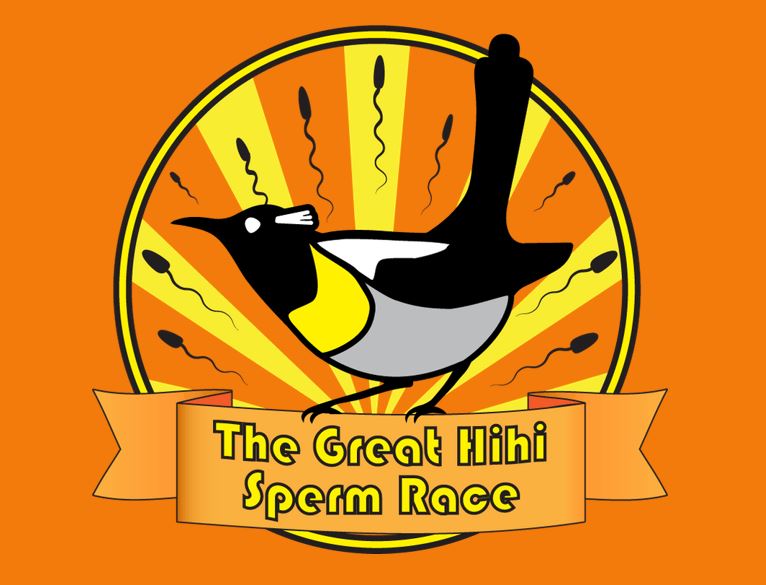‘SPERM RACE’ HIGHLIGHTS PLIGHT OF NATIVE NEW ZEALAND BIRD
Saving one of New Zealand’s vulnerable birds could come down to the speed of its sperm.
Scientists working to save the hihi – or stitchbird -have devised a global competition for punters to guess which bird has the fastest little swimmers and raise money for hihi conservation at the same time.
The Great Hihi Sperm Race will pit 128 male birds from four populations across New Zealand’s North Island against each other. Meanwhile, experts from Otago University are analysing hihi sperm samples with the help of a mobile sperm lab, a microscope and a video camera to find the winning bird.
It’s a light-hearted way of raising awareness and much needed conservation funding for a beautiful yellow and black bird that was widespread throughout the North Island until humans arrived, bringing mammals such as rats, destroying hihi habitats, and reducing numbers down to just one population on Hauturu (Little Barrier Island) by the 1880s.
Hihi numbers are higher now, thanks to conservation efforts, but there are still only seven populations in the whole country, it’s not known how many individuals there are, and the future of the sugar-loving bird is still threatened thanks to its reliance on complex mature forest habitats, few of which exist in New Zealand at this point.
Racing their sperm might seem an odd way to highlight this, but it ties in with the work of Dr Helen Taylor from the University of Otago, who collects and studies bird sperm in the wild to shed light on what happens to hihi, and other NZ birds, when their populations become small.
She explained: “Hihi live in a very competitive little world. With few females to mate with, males need strong, fast sperm to ensure they win any race to inseminate a female who may have had several suitors.
“As with any vulnerable species, we want there to be more hihi, to make the species more secure – that means we need as many birds as possible to reproduce successfully and hatch lots of healthy chicks. Good quality sperm is an important part of that.
“But, we know that when populations become small, you also see more mating between relatives (inbreeding) and this can cause issues with male fertility. Given their history, it’s important to understand whether male hihi are firing blanks or producing the speedy swimmers the species needs to survive.â€
Chatting around a camp fire after a day of fieldwork last year, Dr Taylor and colleagues hit upon the idea of betting on which hihi had the fastest sperm and the Great Hihi Sperm Race was born.
Dr Taylor added: “We were going to bet on them for our own amusement but realised that getting people around the world to take a punt on hihi sperm could help raise funds for maintaining existing hihi populations and establishing new ones, as well as raising awareness of a bird many New Zealanders will never have seen.
“People are pretty familiar with birds like kiwi, kÄkÄpÅ, and takahÄ“, but hihi are just as special and just as unique to New Zealand. They’re cheeky little birds with a tonne of personality and some seriously good looking sperm – we’d like them to be a bit more loved by the public.â€
The team took samples from 128 birds in four locations, Hauturu, Tiritiri Matangi Island, Bushy Park, and Zealandia. Participants who manage to pick the birds with the fastest swimmers out of the 128 can win an array of amazing prizes donated by generous sponsors, including:
Family passes on 360 Discovery Ferries to Tiritiri Matangi Island, Auckland Family passes to ZEALANDIA ecosanctuary, Wellington Family tour packages for Sanctuary Mountain Maungatautari, Pukeatua Cases of Hihi Wines Hihi t-shirts from Tumbleweed Tees Honey from Rotokare Scenic Reserve’s own hives Sets of native bird art cards from Bushy Park Sanctuary, Whanganui
To place a bet in the Great Hihi Sperm Race, visit www.hihispermrace.co.nz. Each bet costs just $10 and you can bet on as many birds as you want. Betting is open until midnight on Sunday 22nd April NZ time. The winning bird will be the male that is found to have the fastest swimming sperm according to Dr Taylor’s analyses.
Gentleman hihi, start your…er…engines!
For more information, contact: Helen Taylor, Department of Anatomy, University of Otago +64 (0)21 279 1126; helen.taylor@otago.ac.nz
